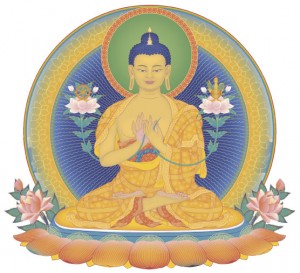I was reading Nagarjuna’s Madhyamaka by Jan Westerhoff, when I came across the following sentence on page 27:
‘It is interesting to note that in the later dGe lugs commentarial tradition, three varieties of existential dependence are distinguished: causal dependence, when an object depends for its existence on its causes and conditions; mereological dependence, when an object depends on its parts; and conceptual dependence, postulating the dependence of an object on a basis of designation, a designating mind, and a term used to designate the object.’
 |
| Mereological dependence |
Mereological?
Now there’s a word I’d never come across before. So I looked it up
in Wiki…
‘In philosophy and mathematical logic, mereology (from the Greek µ????, root:
µe?e(s)-, "part" and the suffix -logy "study, discussion, science")
treats parts and the wholes they form…
…Standard university texts on logic and mathematics are silent about mereology, which
has undoubtedly contributed to its obscurity.’ That probably
explains why I had never heard of it before.
As Tom Etter puts it:
“Mereology? What on Earth is that?” you ask. Well you may ask, since you
won't find the word in the American Heritage dictionary, nor even in the 8-volume
Encyclopedia of Philosophy. However, if you look in the more enlightened Cambridge
Dictionary of Philosophy, you'll discover that mereology is “the mathematical theory
of parts and wholes.” A very useful word, wouldn't you say? How have we managed all
these years to get along without it?'
Googling around, I found an article by Greg Goode that explains mereological
dependency as follows:
‘The way a thing depends on its pieces and parts. In Western philosophical terms,
this might be referred to as mereological dependency. The pieces and parts of an object
are sometimes called its "basis of designation." According to the emptiness
teachings, we would see roots, a stalk, branches and leaves, and based on this, designate
the object as a "tree." These various parts are the tree's basis of designation.
Being a tree is dependent upon the basis of designation. The tree cannot be said to exist
if its basis of designation did not exist.
For example, if you have a car in the parking lot over a long period of time, and
vandals come and steal pieces here and there over several months, there will come a
certain point at which there won't be enough parts for you to call it a car. This is how
the car depends upon its pieces and parts, or its basis of designation. Even though this
seems reasonable if we think about it like this, it's nevertheless easy to think that the
true car exists in a way apart from the basis of designation, as though there were a
"true car" that existed in an ideal realm of some sort. This sense that the car
exists without depending on its basis of designation is the sense of the inherent
existence of the car. This is more subtle than "Meeting"-style dependence.'
On further reflection I realised that I had in fact come across the Greek root
‘meros’ ('part') before - back in the dim and distant past of school
organic chemistry lessons...
Mere Mereology isn't enough
From Wiki: ‘In chemistry,
isomers (from Greek ?s?µe???, isomerčs; isos = "equal", méros =
"part") are compounds with the same molecular formula but different structural
formulas. Isomers do not necessarily share similar properties, unless they also have the
same functional groups. There are many different classes of isomers, like stereoisomers,
enantiomers, geometrical isomers, etc. There are two main forms of isomerism: structural
isomerism and stereoisomerism (spatial isomerism).’
So, we can have objects composed of exactly the same parts - molecules made of identical
numbers of identical atoms - but whose properties differ physically, chemically and
biologically. Even subtle differences of orientation such as mirror-imaging of atoms
within molecules can drastically change their biological activities.
 |
| Optical isomers |
Alternative terms to ‘Mereology’
This raises the question of whether the term ‘mereology’ is altogether adequate
as a description of this second level of existential dependence. Some notion
of structure and arrangement, in addition to a simple list of parts, is required. If
you randomly throw together all the components in the designer’s bill of
materials for a car you won’t get a working vehicle...
Geshe Kelsang Gyatso,
in Joyful Path of Good Fortune pages 348 to 349, when discussing the three levels of
existential dependence includes ‘parts’ to mean ‘aspects, divisions and
directions’. Tom Etter in ‘Quantum
Mechanics as a Branch of Mereology’ extends the scope of mereology beyond its
standard definitions to include the ‘mereology of relations’ – in other
words all those concepts handled by Relational Databases, for example entity/attributes
and substructures.
New terminology needed?
So is there a more suitable single word in English than mereology to
describe this second level of existential dependence?
The word would not only have to include the relations of parts to whole, but also include
the following relations:
- orientation
- composition
- connection
- arrangement
- configuration.
- combination
- layout
- attributes
- properties
- structure and substructure
To anyone who works with with relational databases, especially as used for product
specifications, the all-inclusive concept is familiar. It’s just that there
isn’t a word for it in English. (How about Sanskrit?).



